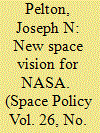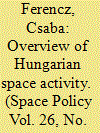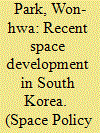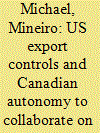| Srl | Item |
| 1 |
ID:
096161


|
|
|
|
|
| Publication |
2010.
|
| Summary/Abstract |
Despite its scientific successes, NASA has over the past two decades lost its way, spending billions of dollars on transportation systems that have at bottom been failures. President Obama's cancellation of the costly and unwieldy Constellation program provides an opportunity for genuine reform of the agency and the US space program, through harnessing the innovatory and cost-effective power of commercial entrepreneurs. Examples of the kinds of project they might undertake - including solar power satellites, 'space taxis' and a space elevator - are discussed.
|
|
|
|
|
|
|
|
|
|
|
|
|
|
|
|
| 2 |
ID:
096165


|
|
|
|
|
| Publication |
2010.
|
| Summary/Abstract |
The era of modern space research and applications began with the 1945-46 Moon-radar experiments and with the successful launch of the first artificial satellite, Sputnik-1. Hungary and Hungarian engineers/researchers were present at the birth of this new and important discipline. As a consequence of the Second World War Hungary became part of the Soviet bloc and, for the first 30 years of the Space Age, Hungarian space activity was carried out mainly within Intercosmos; however, some highlights were produced. After the collapse of the communist dictatorship Hungarian space activity was successfully rebuilt and the past 20 years have seen the beginning of the integration of Hungarian space activity into ESA and EU space policy. Hungarian society's attitude to the country's space activity is complex, as is that of its decision makers. This largely results from the simplified picture of global space activity and Hungarian participation therein in people's minds and from the ignorance of the country's decision makers. While this is basically a global problem, it has a special Hungarian aspect in the view that a small country has no real role in the world, in the EU, in ESA or in global space activity. We have a task: to change this mind-set.
|
|
|
|
|
|
|
|
|
|
|
|
|
|
|
|
| 3 |
ID:
096163


|
|
|
|
|
| Publication |
2010.
|
| Summary/Abstract |
Using the global commons for "peaceful purposes" is agreed upon among states in principle but disputed in substance. While non-militarization has been superceded by the doctrine of non-aggression, the latter, as a necessary rather than sufficient condition for "peaceful purposes", is tested to its limit by the pressing issue of space weaponization. An international treaty to plug the gaps of the Outer Space Treaty should be negotiated. This would require the prohibition of both weapons in outer space and anti-satellite weapons on Earth. The Draft Treaty on Prevention of the Placement of Weapons in Outer Space and of the Threat or Use of Force against Outer Space Objects, proposed by Russia and China at the Conference on Disarmament, is an effort in this direction. However, divided views are held on several issues arising from the draft treaty, e.g. the efficiency of the current regime of outer space law, definitions of "weapons in space" and "threat or use of force", and verification. A primary reason for US opposition to the draft treaty are security concerns over its space assets. However, exercising the right of self-defense is excluded from the obligations of disarmament and this is explicitly affirmed in the draft treaty.
|
|
|
|
|
|
|
|
|
|
|
|
|
|
|
|
| 4 |
ID:
096174


|
|
|
|
|
| Publication |
2010.
|
| Summary/Abstract |
The London Institute of Space Policy and Law is presenting a series of seminars on risks associated with space activity and its insurance, aimed at fostering better understanding of the risks particular to commercial space projects, and at encouraging appropriate policy measures. Seminar IV-I on 5 February 2010 focused on policy and regulatory risk considerations for satellite communications. After an introduction by the seminar chair Jeremy Rose, senior consultant at telecommunications consultancy Comsys, and a welcome from Institute Director Sa'id Mosteshar, four speakers outlined the ideal regulatory framework for satellite communications, as well as current regulatory and policy risks at the international, regional and national level. Risks were discussed in ITU, EU and UK procedures and policies and debate was continued from the floor. The event's rapporteur summarizes the issues highlighted by the speakers and some of the interventions from the floor.
|
|
|
|
|
|
|
|
|
|
|
|
|
|
|
|
| 5 |
ID:
096172


|
|
|
|
|
| Publication |
2010.
|
| Summary/Abstract |
Despite some setbacks - notably an indigenous launch failure - progress is being made in South Korea's space program and its public image has been boosted by the first flight of a Korean astronaut to the ISS. This report provides an update on recent and forthcoming space activities in the country and on its current cooperative arrangements.
|
|
|
|
|
|
|
|
|
|
|
|
|
|
|
|
| 6 |
ID:
096170


|
|
|
|
|
| Publication |
2010.
|
| Summary/Abstract |
This is an edited version of the Executive Summary of a report produced to advise government ministers on the options for UK involvement in space exploration. It sets out four options - from reduced involvement through robotic-only to a fully integrated human and robotic involvement - and discusses the economic and social benefits of each. Given other countries' interest in pursuing exploration, timing is of the essence.
|
|
|
|
|
|
|
|
|
|
|
|
|
|
|
|
| 7 |
ID:
096176


|
|
|
| 8 |
ID:
096173


|
|
|
|
|
| Publication |
2010.
|
| Summary/Abstract |
The International Institute of Space Commerce (IISC) held a workshop on the influence of the financial crisis on the space sector in Douglas, Isle of Man from 18 to 19 November 2009. A number of experts presented their views on this topic. A summary of their generally upbeat findings are presented below.
|
|
|
|
|
|
|
|
|
|
|
|
|
|
|
|
| 9 |
ID:
096168


|
|
|
|
|
| Publication |
2010.
|
| Summary/Abstract |
As a result of increasing public and political interest in 'space' (i.e. solar system) exploration at the global scale, the Space Advisory Group of the European Commission has evaluated the situation in Europe with regard to its potential to participate in this ambitious global enterprise. Aspects of science, technology, environment and safety, society, spin-offs and international cooperation were all considered. The group concluded that Europe possesses sufficient key technologies and scientific expertise to play a major role in international space exploration and has recommended that the EU take a central role to ensure the success of future European space exploration, not only to give a clear political signal for the way forward but also to ensure an appropriate financial framework. In this way Europe would embrace the spirit of the European Space Policy and contribute to the knowledge-based society by investing significantly in space-based science and technology, thereby playing a strong role in international space exploration.
|
|
|
|
|
|
|
|
|
|
|
|
|
|
|
|
| 10 |
ID:
096164


|
|
|
|
|
| Publication |
2010.
|
| Summary/Abstract |
Canada is a space power with unique technical niches that support opportunities for collaboration on space technologies. When U.S.-origin space technologies are involved Canada's ability to collaborate internationally may be conditional on US law and policy. As a result, US export control law can be directly linked to the success or failure of Canadian collaboration. This article examines the strategic impact of U.S. export controls on Canadian autonomy to collaborate on international missions, including multi-use missions. Canadian space export control policy is also examined more broadly with the goal of providing specific policy recommendations that will enhance Canada's future as an international space actor.
|
|
|
|
|
|
|
|
|
|
|
|
|
|
|
|
| 11 |
ID:
096162


|
|
|